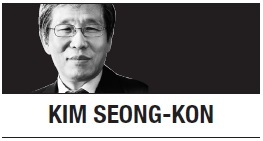[Kim Seong-kon] Certain endings and new beginnings
By Kim Seong-konPublished : July 4, 2017 - 17:44
 Last week, the LTI Korea Translation Academy held the commencement ceremony for our graduates of 2017. As president of the academy, I was so proud of the students from different nations who wore gorgeous academic gowns and caps, with big smiles on their faces and certificates of graduation in their hands.
Last week, the LTI Korea Translation Academy held the commencement ceremony for our graduates of 2017. As president of the academy, I was so proud of the students from different nations who wore gorgeous academic gowns and caps, with big smiles on their faces and certificates of graduation in their hands.
During my congratulatory remarks, I asked them to always keep three things in mind wherever they go. I told them, “First, I want you to build a cultural and literary bridge connecting the world, like the Bosphorus Bridge in Istanbul, Turkey. Second, always remember that you are a translator and interpreter between the East and the West, and between Korea and your country. Third, try to become a cultural ambassador of Korea to your nation.”
I also told the international students not to forget their professors at the academy even after graduation. I said, “You could not have had the pleasure and honor of graduating today without the guidance of your professors. In Korea we say, once a teacher, always a teacher. We never refer to our teachers as ‘former’ teachers because we believe there is no expiration date for our teachers, mentors and professors. In fact, your teachers are your everlasting milestones and guiding constellations long after graduation.”
Finally, I introduced to them the Korean style of friendship that does not care about geographical distance. I told them, “In English, we say, ‘Out of sight, out of mind.’ But Koreans do not seem to abide by the maxim. Once we become friends, our friendship is everlasting, no matter where you are. Actually, Korean folk songs, pop songs and poetry are full of the theme of missing someone who is far away, for example a lover, a friend and a family member.”
I asked the graduating foreign students not to forget their Korean friends as well. I told them, “I strongly hope that the certificate of graduation will be a constant reminder of your everlasting friendship with Korea, which, I hope, can be your second home and a point of reference to which you return again and again in the future.” I added, “Since you can communicate in at least two languages, you have two minds, a dual vision and comparative perspective, which is a blessing. Now you are ready to accomplish what the great American poet Walt Whitman once described as ‘a rondure of the world, at last accomplish’d.’”
When I had the honor of delivering a speech at the commencement ceremony of the State University of New York at Buffalo a few weeks ago, I urged graduating American students to broaden their horizons so they can hold the world in their arms, embrace ethnic diversity, and accept cultural differences. I said, “I believe that is the spirit of the humanities, SUNY/Buffalo and the United States!”
I continued, “I always think of Buffalo, New York as my second hometown because I spent the best years of my life here. Seoul is my primary home to which I constantly return after I travel abroad. But what is a home? A home is a place where you are happy, comfortable, and relaxed. A home is a place where you have family members, relatives and dear friends who care about you. It is a place full of sweet memories of your childhood or adolescence. And it is a place you intensely miss when you are away. If that is the case, then Buffalo is definitely my home.”
Then I urged American students to find their second home elsewhere. “Even a foreign city or a foreign country can be your second hometown and second homeland.” Indeed, the new literary movement, Transnationalism, allows loyalty to two countries at the same time these days. I advised graduating American students not to fix their love on one place, but to extend their love to all places, if they want to become a perfect person, a spiritual exile, and a truly global citizen.
While addressing the graduating foreign students, I thought about America today that had recently declared, “America First!” and “Make America great again!” I understand America’s situation fully, and yet I cannot but help noticing there are some contradictions in the two slogans. If you want to be truly great, you are not supposed to say, “Me first!” which sounds selfish and childish. To be great is to be generous, diverse and flexible. That is the spirit of America and that is the essence of the American Dream. If America abandons its role of a cross-cultural bridge, interpreter and cultural ambassador, and demanded its allies return the favor monetarily, another country will take its place as the leader of the world.
Now I am preaching what I learned from my American professors when America was truly great decades ago. Meanwhile, America seems to be no longer interested in cross-cultural understanding or humanitarian causes. That makes me sad, and yet the original, true American greatness still lives in me as a legacy.
By Kim Seong-kon
Kim Seong-kon is a professor emeritus of English at Seoul National University and president of the Literature Translation Institute of Korea. He can be reached at sukim@snu.ac.kr. -- Ed.








![[Graphic News] More Koreans say they plan long-distance trips this year](http://res.heraldm.com/phpwas/restmb_idxmake.php?idx=644&simg=/content/image/2024/04/17/20240417050828_0.gif&u=)
![[KH Explains] Hyundai's full hybrid edge to pay off amid slow transition to pure EVs](http://res.heraldm.com/phpwas/restmb_idxmake.php?idx=644&simg=/content/image/2024/04/18/20240418050645_0.jpg&u=20240419100350)





![[From the Scene] Monks, Buddhists hail return of remains of Buddhas](http://res.heraldm.com/phpwas/restmb_idxmake.php?idx=652&simg=/content/image/2024/04/19/20240419050617_0.jpg&u=20240419175937)

![[KH Explains] Hyundai's full hybrid edge to pay off amid slow transition to pure EVs](http://res.heraldm.com/phpwas/restmb_idxmake.php?idx=652&simg=/content/image/2024/04/18/20240418050645_0.jpg&u=20240419100350)

![[Today’s K-pop] Illit drops debut single remix](http://res.heraldm.com/phpwas/restmb_idxmake.php?idx=642&simg=/content/image/2024/04/19/20240419050612_0.jpg&u=)